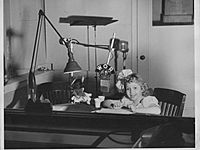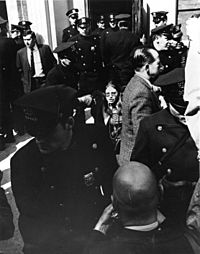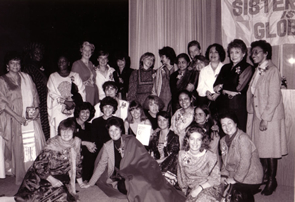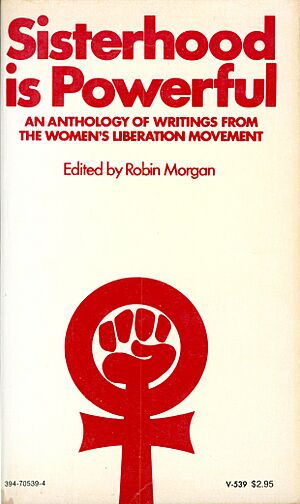Robin Morgan facts for kids
Quick facts for kids
Robin Morgan
|
|
|---|---|
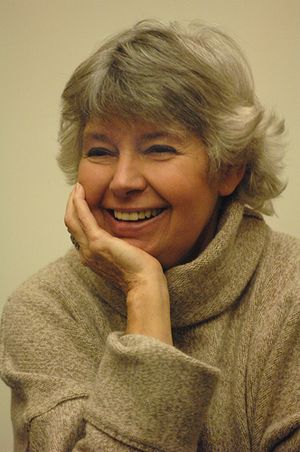
Morgan in 2012
|
|
| Born | January 29, 1941 Lake Worth, Florida, U.S.
|
| Education | Columbia University (BA) |
| Occupation |
|
| Years active | 1940s–present |
|
Notable work
|
Sisterhood anthologies |
| Spouse(s) |
Kenneth Pitchford
(m. 1962–1983) |
| Children | Blake Morgan |
Robin Morgan (born January 29, 1941) is an American poet, writer, and activist. She was also a child actor. Since the 1960s, she has been an important member of the American Women's Movement. She is also a leader in the international feminist movement, which works for women's rights.
Her 1970 book, Sisterhood Is Powerful, was named by the New York Public Library as one of the 100 most important books of the 20th century. She has written more than 20 books of poetry, stories, and non-fiction. She was also the editor of Ms. magazine.
In the 1960s, Morgan took part in the civil rights and anti-Vietnam War movements. She helped start several groups for women's rights, including New York Radical Women and W.I.T.C.H. She also co-founded the Women's Media Center with activist Gloria Steinem and actor Jane Fonda. In 2018, the BBC listed her as one of its 100 Women.
Contents
A Star from a Young Age
When Robin was a child, her mother told everyone she was a year younger than she really was. This was because of private family circumstances at the time of her birth.
Robin started as a child model when she was a toddler. At age five, she had her own radio show in New York called Little Robin Morgan. She was also a regular on the radio show Juvenile Jury.
Her acting career grew when she was eight. She starred in the TV series Mama as Dagmar Hansen, the youngest sister. The show was a big hit.
During the early days of television, Morgan appeared in many popular shows. These included Alice in Wonderland, Suspense, and Hallmark Hall of Fame. She worked with famous directors, writers, and actors.
Even though she was a successful actor, Morgan had wanted to be a writer since she was four. At age 14, she decided to leave the cast of Mama to follow her dream of writing.
A Writer and Activist
After her acting career, Robin Morgan studied at Columbia University. She worked as a secretary at a literary agency, where she met famous writers like the poet W. H. Auden. She also began publishing her own poetry.
In 1962, Morgan married the poet Kenneth Pitchford. They had a son, Blake Morgan, in 1969. The couple later divorced. During this time, she worked as an editor at a publishing company called Grove Press. She joined an effort to form a union to protect workers' rights. When the company fired her and others who supported the union, she led a protest where they occupied the company's offices.
In the mid-1970s, Morgan became an editor for Ms. magazine. From 1989 to 1994, she was the editor-in-chief. She turned it into a successful international magazine that won awards for its writing and design.
In 1979, Morgan was featured on a Supersisters trading card. The set included famous women from many fields. Today, these cards are in museum collections.
In 2005, Morgan co-founded The Women’s Media Center with Jane Fonda and Gloria Steinem. In 2012, she started a weekly radio show and podcast called Women’s Media Center Live With Robin Morgan. The show features her thoughts on current events and interviews with interesting people.
Fighting for Fairness
By 1962, Morgan was active in movements for social change. She wrote articles and poetry for journals that supported these causes. She became very involved in the civil rights movement and protests against the Vietnam War.
Morgan noticed that women were not always treated fairly, even within these movements. This led her to focus on feminism, the movement for women's equality. In 1967, she helped start the group New York Radical Women. She organized their first major protest at the Miss America pageant. For this protest, she designed a new feminist symbol.
In 1968, she co-founded W.I.T.C.H., a feminist group that used public street performances to draw attention to unfair treatment of women. She also helped popularize the term "herstory" (a new word for history that focuses on women's experiences).
In 1970, she wrote a famous essay called "Goodbye to All That." In it, she explained why she was leaving the male-led protest movements to focus on feminism. The essay became well-known for calling out unfairness.
Morgan has traveled the world to learn about and support women's rights in different cultures. She has met with women activists in many countries, from the Philippines to Brazil to South Africa. She has received many awards for her work.
Bringing Women's Voices Together
In 1970, Morgan created Sisterhood is Powerful. It was the first major collection of writings from the feminist movement. The book included essays by important activists and key documents from women's groups. The New York Public Library named it one of the most important books of the century.
With the money she earned from the book, Morgan started The Sisterhood Is Powerful Fund. This was the first U.S. foundation that gave grants to support feminist projects.
She later created two more books in the series:
- Sisterhood Is Global: The International Women's Movement Anthology (1984): This book included articles about women in over 70 countries.
- Sisterhood Is Forever: The Women's Anthology for a New Millennium (2003): This book looked at the past and future of the feminist movement.
A Career in Writing Books
Robin Morgan has published 21 books, including poetry, fiction, and non-fiction. Before she was known as a feminist leader, she was respected as a serious poet. A review in The Washington Post called her first book of poems, Monster, "a powerful, challenging book."
Her poetry collections include A Hot January and Upstairs in the Garden. Famous writers like Alice Walker have praised her poetry for being brave and beautiful.
Morgan has also written fiction. Her books include Dry Your Smile and The Mer-Child: A Legend for Children and Other Adults. She also wrote a historical novel called The Burning Time, which is based on the first witchcraft trial in Ireland.
Her non-fiction books cover topics like freedom, politics, and her own life. Her book The Demon Lover is a famous study of the political and psychological reasons behind terrorism.
Creating Groups to Help Women
The Sisterhood Is Global Institute
In 1984, Morgan co-founded The Sisterhood Is Global Institute (SIGI) with women from 80 countries. It was the world's first international feminist "think tank" (a group that researches and develops ideas). SIGI works with the United Nations and has played a key role in the global women's movement. The institute helps connect and support women's groups around the world.
Women’s Media Center
In 2005, Morgan co-founded the Women’s Media Center with Jane Fonda and Gloria Steinem. The group's goal is to make women more visible and powerful in the media. They work to ensure women's stories are told and their voices are heard.
Personal Life
Robin Morgan grew up in New York. She published her first serious poetry in literary magazines when she was 17. Today, she lives in Manhattan. Her son, Blake Morgan, is a musician and the founder of a record company.
In 2000, Morgan published her life story, Saturday's Child. In the book, she wrote about her childhood, her acting career, her family, and her work as an activist.
In 2013, Morgan announced that she had been diagnosed with Parkinson's disease. She has since become an advocate for others with the illness. She works with the Parkinson's Disease Foundation to improve research and support for women with the disease. She has also written new poetry about her experience.
Filmography
- Citizen Saint: The Life of Mother Cabrini (1940s)
- The Little Robin Morgan Show (1940s)
- Juvenile Jury (1940s)
- Mama (1950s)
- Kraft Television Theatre's Alice in Wonderland (1950s)
- Tales of Tomorrow (1950s)
- The American Experience (2002)
- 1968 TV Documentary with Tom Brokaw (2007)
- Makers: Women Who Make America (2013)
See also
 In Spanish: Robin Morgan para niños
In Spanish: Robin Morgan para niños
 | Mary Eliza Mahoney |
 | Susie King Taylor |
 | Ida Gray |
 | Eliza Ann Grier |


